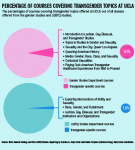Transgender student advocates call for more transgender research and healthcare provisions on campus.
Although UCLA is ranked fifth on College Choice’s Best LGBT Friendly Colleges and Universities this year and is home to the Williams Institute, an LGBTQ research institute, several students said they think UCLA needs more research on transgender health care.
Eli Lawliet, a fifth-year gender studies student who is minoring in LGBTQ studies, said he thinks UCLA fails to address transgender students’ needs.
“It is possible for UCLA to be ranked high as an LGBTQ-friendly school while not doing a very good job on tough issues such as providing surgeries (for transgender students),” Lawliet said.
Lawliet, who is teaching an undergraduate student-initiated course that analyzes transgender healthcare development, said he thinks there are not enough experts on transgender issues at UCLA.
The LGBTQ studies department is short of faculty members specializing in transgender-related topics, said Tomarion Brown, the LGBTQ studies program adviser.
The last LGBTQ studies course with a transgender focus was offered in 2014 by a visiting scholar, Brown said. She added doctoral students in other departments have taught courses that cover transgender issues.
“Many courses in the LGBTQ department touch upon transgender and bisexual issues, but very few of them focus on it specifically,” Brown said.
Transgender health care provisions are inadequate partly because transgender research has only recently gained attention and transgender scholars are scarce, said L. Wynholds, an information studies doctoral student who studies transgender-related issues.
Wynholds, who taught a course in 2014 as a doctoral student on how the U.S. health information system records transgender individuals’ health information, said students need to base their courses on the research they do in their own doctoral fields because there is limited transgender-specific research they can refer to.
Brown said her department hopes to include more transgender experts in the LGBTQ department when it launches the first LGBTQ studies doctoral program in the U.S. in 2019.
“UCLA is forward with a lot of things,” Brown said. “What we need now is to be more forward and innovative, bringing more (LGBTQ) research and faculty members to the campus,” Brown said.
Lawliet said UCLA used to have a Gender Identity Research Clinic that tried to change the gender identities of children who identified as a gender different than their biological sex.
[Related Story: Study shows link between discrimination, transgender suicide attempts]
UCLA eventually abolished the clinic and medical professionals now attempt to provide more comprehensive health care for transgender people, Lawliet said.
The UCLA Gender Health Program, launched in September 2016, aims to provide students with transitioning surgeries and primary health care after they transition into a different gender, said program director Amy Weimer.
The University of California Student Health Insurance Plan currently does not cover services such as breast removal and chest surgeries. However, Weimer said she thinks the Ashe Center could help refer students to surgeons involved in the UCLA Gender Health Program.
[Related Story: UC SHIP board looking to add surgery options for transgender students]
Many transgender patients feel uncomfortable describing their gender identities and communicating their worries to doctors, Weimer said. Medical professionals at the Gender Health Program try to improve transgender patients’ healthcare experiences by getting to know their concerns and tailoring services to their needs, she added.
The UCLA health system does not offer training programs for transgender health care providers, but there are various opportunities for medical professionals to learn more about providing health care for transgender people, Weimer said.
For example, the first World Professional Association for Transgender Health Conference, held in UCLA in February, provided media training, research panels and scientific symposiums for transgender health care providers, she added.
Lawliet said he appreciates UCLA’s ongoing efforts to advocate for transgender people on campus, such as implementing gender-inclusive restrooms, but hopes the university will continue to do more.
“UCLA is doing a better job than many other schools and than it did 60 years ago,” Lawliet said. “But we have to admit there is still a long way to go.”
